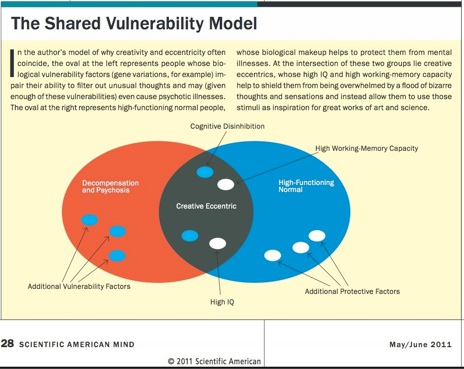Omphaloskepsis Blog
Now I know why artists are important...
Apr 18, 2011

- People who are highly creative often have odd thoughts and behaviors‚ÄĒand vice versa.
- Both creativity and eccentricity may be the result of genetic variations that increase cognitive disinhibition‚ÄĒthe brain‚Äôs failure to filter out extraneous information.
- When unfiltered information reaches conscious awareness in the brains of people who are highly intelligent and can process this information without being overwhelmed, it may lead to exceptional insights and sensations.

Prestigious business schools‚ÄĒsuch as Harvard, Stanford, Columbia and Yale‚ÄĒhave added courses on creativity to their curricula.
Scientific American, The Unleashed Mind: Why Creative People Are Eccentric Highly creative people often seem weirder than the rest of us. Now researchers know why By Shelley Carson  | April 14, 2011 | 36
 
Another thing to review would be Dabrowski's overexcitabilities. Here's a nice synopsis in this SENG article that begins like this:
A small amount of definitive research and a great deal of naturalistic observation have led to the belief that intensity, sensitivity and overexcitability are primary characteristics of the highly gifted. These observations are supported by parents and teachers who notice distinct behavioral and constitutional differences between highly gifted children and their peers. The work of Kazimierz Dabrowski, (1902-1980), provides an excellent framework with which to understand these characteristics. Dabrowski, a Polish psychiatrist and psychologist, developed the Theory of Positive Disintegration as a response to the prevalent psychological theories of his time. He believed that conflict and inner suffering were necessary for advanced development - for movement towards a hierarchy of values based on altruism - for movement from "what is" to "what ought to be." Dabrowski also observed that not all people move towards an advanced level of development but that innate ability/intelligence combined with overexcitability (OE) were predictive of potential for higher-level development. It is important to emphasize that not all
I just want to leave you with a quote from a great poet:
 "One of the great functions of art is to help us imagine what it is like to be not ourselves, what it is like to be someone or something else, what it is like to live in another skin, what it is like to live in another body, and in that sense to surpass ourselves, to go out beyond ourselves." --Adrienne Rich
 
The photo at the top is my 10 year old getting an acne facial. There's something disturbing about a 10 year old getting a facial.
 
[I created and taught the one of the first creativity courses in university setting in 1996 at Syracuse University. And I have to acknowledge a huge debt of gratitude to the complete autonomy given to me to liberate the curricula that was expected and do something completely unexpected. I was fully supported by the department from my mentor, Toni Tonland, to the program chair, the late and oh so wonderful John Sellers, up through the late dean, Dean Lancy.]
 MENU
MENU